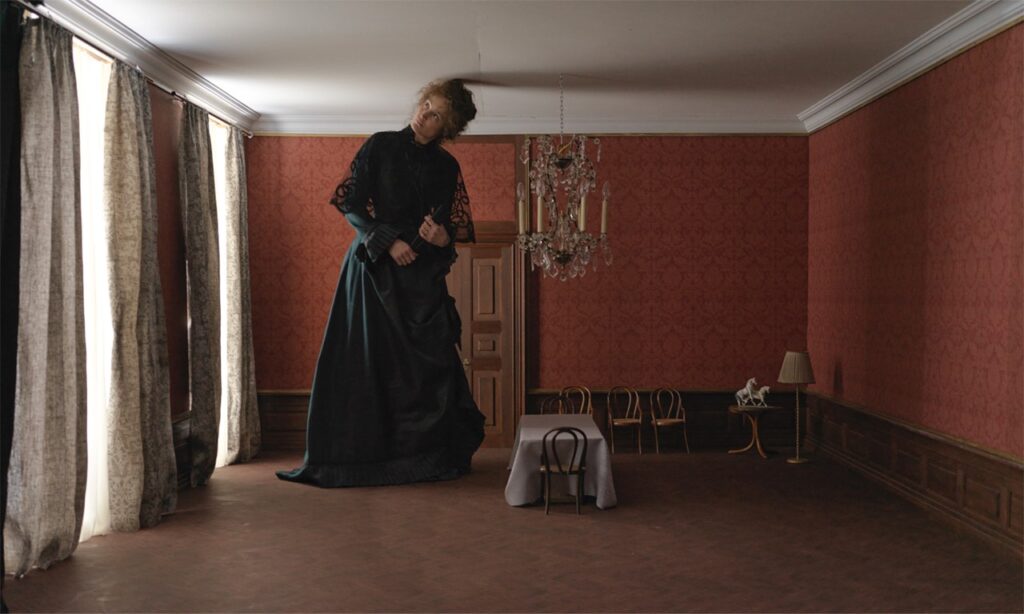“Never forget, no matter bronchitis or headache, you are the Empress,” Vicky Krieps is told in “Corsage,” Marie Kreutzer’s fictionalized account of Empress Elisabeth of Austria. The film accompanies the celebrated historical figure during the year she holidays across Europe, sticking a middle figure – figuratively and literally – to an institution that has dehumanized her since her marriage to Emperor Franz Joseph I of Austria at 16. Krieps is a mischievous, recalcitrant Elisabeth who is anything but an emperor’s docile wife. In “Corsage,” we witness her undergo a mid-life coming-of-age, unapologetically discovering who she is outside her designated roles as Empress, wife, mother, and spectacle.
We meet Elisabeth in 1877 as she turns 40, a milestone that proves more punitive than celebratory for a woman once idolized for her beauty. Elisabeth now contends with the societal expectations — or penalties — of middle age, including the pressures to preserve her beauty and maintain her weight. She learns that her courtly and familial duties have been reduced to a role of hollow ornamentation: her husband refuses to confide in her, and her children no longer respect her. Elisabeth’s young daughter Valerie (Rosa Hajjaj) even chides her mother for embarrassing her by openly smoking. “I have nothing to hold on to. Except myself,” Elisabeth confesses. “And sometimes even that seems like an incredible effort.”
Elisabeth thus exists to perform an instrumental, symbolic role as the Empress, upholding the pageantry of the court to conceal a decaying monarchy. The problem is that Elisabeth is wholly indifferent to royal directives, let alone PR damage control. One scene sees Elisabeth counterfeiting illness during a public appearance, rolling her eyes and dropping to the ground with theatrical prowess. Another sees her lighting up at an official dinner, then unceremoniously leaving the table but not without a farewell gesture, a petulant middle finger to the awestruck guests. “Your duty is merely to represent,” Franz Joseph (Florian Teichtmeister) decrees the morning after. “That’s what I chose you for. That’s what you’re here for.”
Her husband’s resistance only seems to embolden Elisabeth further in her mutiny. The film notably rejects the impulse to romanticize the Empress – as previous dramatic accounts have – to offer a humanized portrait of a woman protesting against a tradition that suffocates more than a corsage, the 19th-century term for a fitted bodice. As Kreuzter told us, Elisabeth has been commodified as a tourist attraction in Austria and mythologized by the “Sisi” trilogy starring Romy Schneider. The director explained that she wanted to expose the “darker side” of Elisabeth by detailing “her rebellion against the role she was supposed to play, which included staying young and beautiful forever.” She added that the “story of a woman who has to please in order to be loved is universal and timeless.”
We see how the corsage — which, by the way, constricts her waistline to a shocking 45 centimeters — represents not only the behavioral restrictions that kept Elisabeth in line as a figurehead, but also represents the façade of propriety she dons like a costume. Observing Elisabeth, Countess Marie Festetics (Katharina Lorenz) narrates that beneath the finery, “Her soul is like a chaotic museum. Full of treasures that cannot be exploited.” The lady-in-waiting and one the closest confidants of the Empress, Marie captures the loneliness of Elisabeth’s plight that she herself never vocalizes. “She lives in a different world where she is walking a path so narrow that only one person can walk it,” Marie reflects in the film.
In addition to the fractured relationships with her family and almost-lovers, Elisabeth’s revolt against institutional discipline belies, it seems, a desire for solitude. Space to be herself, away from prying eyes. Kreuzter shared that it was this “silent rebellion” that attracted her to Elisabeth. “She certainly lived in a golden cage and tried to expand her position’s boundaries as far as she could,” she told us.
We feel Elisabeth’s cathartic liberation from decorum when she refuses to mourn the expiration of her youth and instead seize the chance for self-actualization. Watching “Corsage” from a contemporary frame of reference, viewers will be surprised by how much they share Elisabeth’s relief as she abandons the accouterments of 19th-century womanhood and nobility. We cheer her on when she, to the horror of her handmaids, shears off her long hair, and when she gets matching anchor tattoos with Marie. We let out a sigh of relief when she finally unlaces her corsage, the same way we do when we unhook our bras at the end of the day.
“Corsage” will be in theaters December 23. The film premiered at Cannes this year, where Krieps took home Best Performance in the Un Certain Regard section.







